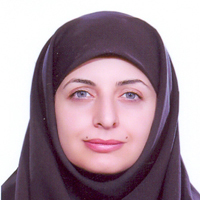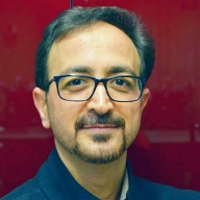دکتر گیتی کریمخان لویی
-
Background & Objective
Administered by the Iranian Center for the Measurement of Medical Education, national university entrance exams are administered nationwide where English constitutes a vital section. This study aimed to assess dimensionality, discrimination power and difficulty of English test items in this graduate entrance exam.
Material & MethodsThis quantitative study examined 160 English test items administered to 41633 test-takers applying for graduate studies in Iranian universities of medical sciences in 2021, and reported the characteristics of test takers during three successive years (2019, 2020, and 2021). NOHARM software (version 4.0) was used to analyze the data by examining dimensionality of the tests reporting a two-parameter model.
ResultsGenerally, female participants outnumbered the male, with a similar pattern among the admitted participants (70% females vs. 30% males). A positively significant correlation was found between participants’ Grade Point Average and English test scores (p < 0.05). In 2021, the results of four administration sessions with a high reliability (i.e. 0.92, 0.88, 0.90 and 0.91) were analyzed separately. Two dimensionality parameters (i.e., difficulty & discrimination) fitted the model while the guessing parameter did not. English tests proved to be “difficult”, with either “high” or “very high” discrimination power. Neither “easy” nor “very easy” items were found. No items were associated with “no” or “very low” discrimination power.
ConclusionOverall, the tests functioned well; however, more research is required to rigorously evaluate the exams. Improvements concerning the social and long-term effects of these tests are suggested.
Keywords: :English Language, Testing, National Exam, Graduate Level, Medical Education -
زمینه و هدف
مطالعات نشان می دهند که دانشجویان حتی پس از چندین سال حضور درکلاسهای زبان انگلیسی تمایل کمتری به تعامل در کلاس های زبان انگلیسی دارند. هدف کلی این پژوهش یافتن عوامل موثر بر تعامل به زبان انگلیسی در کلاس های پزشکی بود.
روش بررسیشرکت کنندگان در این مطالعه 252 نفر از دانشجویان پزشکی دانشگاه علوم پزشکی زنجان بودند که در یکی از رشته های دندانپزشکی، پزشکی و داروسازی مشغول به تحصیل بودند و درس زبان انگلیسی با اهداف ویژه (ESP) را می گذراندند. به منظورگردآوری داده ها از پرسشنامه تمایل به ایجاد تعامل (willingness to communicate) مکین تایر استفاده شد. پس از جمع آوری اطلاعات لازم در قالب پرسشنامه مذکور، داده ها با استفاده از نرم افزار (20) SPSS مورد تجزیه و تحلیل قرار گرفت.
یافته هادر مدل ساختاری AMOS، متغیرهای متعددی مورد بررسی قرار گرفت.یافته ها مسیرهای معناداری بین اعتماد به نفس و انگیزه و WTC در کلاس های ESP را نشان می داد. انگیزه تاثیر مثبتی بر اعتماد به نفس داشت. دسترس بودن استاد تاثیر منفی بر کمرویی، و تاثیر مثبت بر روی انگیزه تعامل در کلاس ESP را داشت. از سوی دیگر بر اساس یافته های مطابق با نمودار AMOS مسیرهای کمرویی به سمت انگیزه و اعتماد به نفس منفی بود. همه مسیرها در 0.05 معنادار بودند.
نتیجه گیرییافته های این مطالعه نشان داد که تعامل دانشجویان به زبان انگلیسی به متغیرهای مختلفی بستگی دارد. با توجه به اینکه صحبت کردن به زبان انگلیسی و نیز ایجاد ارتباط جزمهم ترین مهارت های زبانی است، در برنامه ریزی های آموزش زبان انگلیسی توصیه می شود که اهمیت این مهارت در نظرگرفته شود. اساتید زبان باید شرایطی با اضطراب کم ایجاد کنند تا دانشجویان را به صحبت و برقراری ارتباط تشویق کنند. کمرویی و خجالتی بودن متغیر دیگری در طول مطالعه بود که تاثیر منفی بر تعامل به زبان انگلیسی داشت. نتایج این مطالعه همچنین تاکید می کند که دانشجویان با انگیزه بالا وبا اعتماد به نفس، تمایل بیشتری به شرکت در فعالیت های کلاسی و تعامل و مکالمه به زبان انگلیسی دارند. همچنین در این پژوهش مداخله استاد در کاهش اضطراب تاثیر مثبت داشت. یافته های این مطالعه مبین آن است که اساتید می توانند عامل مهمی در افزایش تعامل دانشجویان در کلاسهای زبان انگلیسی باشند.
کلید واژگان: تمایل برای تعامل به زبان انگلیسی (WTC), انگلیسی با اهداف ویژه-اضطراب- انگیزهBackground & ObjectiveIt is argued that students have less tendency to communicate in English classes even after several years of attending language courses. The general objective of this research was to find the effective factors for willingness to communicate in English across medical classes.
Materials & MethodsThe participants in this study were 252 medical students from Zanjan University of Medical Sciences who were majoring in one of the fields of dentistry, medicine and pharmacy and were taking the course of English for Specific Purposes. Macintyre’s Willingness to Communicate questionnaire was used to compile the data. After collecting the data using the questionnaire, they were processed in the statistical package. The collected data were then tabulated and analyzed via SPSS (20) and AMOS.
ResultsIn the structural model, there were significant pathways between self-confidence and motivation and WTC in ESP classes. Motivation had a positive effect on self-confidence. The teacher's immediacy, with its negative impact on shyness, increased the motivation to communicate in the ESP class. On the other hand, the paths of shyness to motivation and self-confidence were negative. All pathways were significant at 0.05.
ConclusionThe findings of this study showed that, as in the previous studies, the tendency to communicate in language classes depends on several variables. Given that communication and speaking are the most important language skills, language learning planning is recommended to consider the importance of this skill. Language teachers should create conditions with low anxiety to encourage learners to speak and communicate. Shyness was another variable during the study that had a negative effect on the WTC. The results of this study also emphasize that highly motivated learners are more likely to participate in classroom activities and communication due to their self-confidence. Also, in this study, the teacher's intervention had a positive effect on reducing anxiety. Thus, it is recommended that teachers play an important role in motivating students to communicate I ESP classes.
Keywords: Specific English, Motivation, Willingness to Communicate (WTC) -
زمینه و هدفپیشرفت های اخیر در تکنولوژی و تغییرات سریع در ارتباطات بر روی روش های تدریس و آموزش زبان انگلیسی تاثیر می گذارد. با پیشرفت ICT اکنون فرصت های زیادی برای اساتید زبان خارجی وجود دارد که بتوانند مهارت های زبان خارجی از جمله مهارت نگارش را تدریس نمایند. نگارش یکی از مهم ترین مهارت های ارتباطی و یکی از پیچیده ترین مهارت هاست که نیاز به تفکر و سازمان دهی دارد.روش بررسیبه منظور انجام این مطالعه 30 دانشجو به طور اتفاقی از میان 100 دانشجوی مرکز تحصیلات تکمیلی علوم پایه ی زنجان انتخاب شدند و به طور تصادفی به دو گروه شاهد و مداخله تقسیم شدند. گروه شاهد آموزش های لازم را به طور سنتی و در کلاس درس دریافت نمودند و گروه مداخله با استفاده از روش CMC آموزش داده شدند.یافته هاآمار توصیفی مقایسه ی میانگین در گروه شاهد و مداخله مبین تفاوت قابل ملاحظه ای در میزان موفقیت در post test دو بود. میانگین نمرات گروه مداخله 85/37 و گروه شاهد 37/32 بود. به عبارت دیگر گروه مداخله دارای نمرات بهتری نسبت به گروه شاهد بودند.نتیجه گیرینتایج نشان داد که نه تنها گروه مداخله دارای نمرات بهتری در مقایسه با گروه شاهد در post test بودند، بلکه تکالیف انجام شده ی آن ها بهتر و مفیدتر بود. روش آموزش نگارش با استفاده از کامپیوتر (CMC) می تواند روش مفیدی برای آموزش این مهارت باشد.کلید واژگان: ایمیل, مهارت نگارش, نگرشBackground And ObjectiveCurrent advances in computer technology and the rapid pace of change in communications affect the way English language (EL) teachers use information technology (IF) to develop students’ writing skills. With the advent of ICT there is now a wide range of opportunities open to classroom teachers. In our opinion, writing is the most important form of communication. It would appear, however, to be one of the hardest to master, for written words require thought and organization. But no matter how hard writing might appear Computer Mediated Communication (CMC) can be a valuable cure for the complex process of writing.Material And MethodsTo conduct this study 30 students were randomly selected from population of 100 students from Institute of Advanced Studies in Basic Sciences (IASBS). They were randomly assigned to control and experimental groups. After being subjected to the instruction both groups were given identical posttests and the results were compared. Not only did the experimental group do better than the control group on posttests but also the length of their writing was shorter and more effective than that of control group.ResultsThe study showed that by using computers, students become better problem solvers and better communicators. Networking people "puts an inspiring, enticing, and usable set of tools within reach of the mass of computer users, empowering them to go beyond simply processing information to repurpose, design, publish, and express" (Mello, 1996). Through this increased electronic access to the world around them, student's social awareness and confidence increases. Networking frees them from the limitations of traditional writing tools that often inhibit and restrict writing processes.ConclusionsLearning is transformed from a traditional passive exercise to an experience of discovery, exploration, and excitement. Students begin to realize their full potential when they are empowered to contribute and collaborate as a team to accomplish their writing tasks more effectively.
- این فهرست شامل مطالبی از ایشان است که در سایت مگیران نمایه شده و توسط نویسنده تایید شدهاست.
- مگیران تنها مقالات مجلات ایرانی عضو خود را نمایه میکند. بدیهی است مقالات منتشر شده نگارنده/پژوهشگر در مجلات خارجی، همایشها و مجلاتی که با مگیران همکاری ندارند در این فهرست نیامدهاست.
- اسامی نویسندگان همکار در صورت عضویت در مگیران و تایید مقالات نمایش داده می شود.




